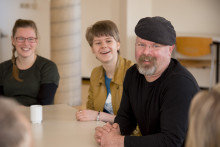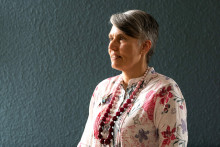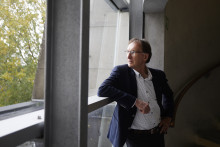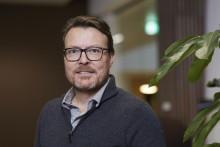Jamie Hyneman received an honorary doctorate at the UT in 2011, but this was his first ever visit to Twente. During his stay, Hyneman participated in a number of activities. He gave two public lectures and explored various labs and facilities at the campus. He is currently on his way to Eindhoven, but UT Nieuws got the chance to interview him right before his departure.

How was your visit? Was it what you’d expected?
‘I had almost no expectations, but what I’ve seen impressed me. I come from Silicon Valley, a place full of startups and people thinking they are “it”, but there are so many great things here. Here I’ve seen really unique and powerful innovations that are carefully dealt with – this is no amateur situation here. There are so many bright and motivated people here, who can hold their own with anyone else I’ve met anywhere else in the world. Furthermore, they are aware of other people’s work and they are making connections outside the university, including me.’
‘Another very important thing that I’ve seen is that people here understand the value of diversity – diversity of backgrounds and knowledge. You need the combination of disciplines, because all of them build foundations of knowledge and there is no school in the world that will teach you absolutely everything. Here you have the possibility to make leaps into other areas, the support and knowledge is there.’
Was there something specific that caught your interest?
‘I was very intrigued by work of one young man I’ve met – Vincent Groenhuis. However, there was a wide range of things I’ve seen that were impressive, such as the Robotics Lab or the medical technology developed here. It’s a very vibrant university. I’ve seen an impressive array of disciplines and topnotch people, who are focused and energetic.’
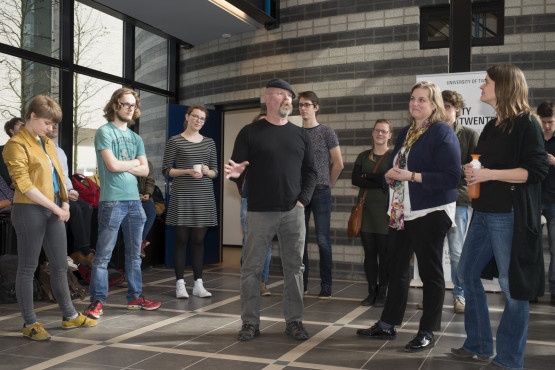
Besides this visit, what are you up to these days, since MythBusters ended about a year ago?
‘I own the facility where MythBusters was filmed and this facility has now become my personal playground, where I work on a variety of devices. It’s basically a place where you go if you don’t know where else to go. It’s very unique; it’s one small place where you can make anything you can dream of. I basically go there in the morning and come out all tired and messy and I’ve made things that didn’t exist before. I work for myself now on a number of projects for governmental and private enterprises.’
‘I have no desire to be on television again, I just like to build stuff. That was probably one of the reasons why the show was so successful – I wasn’t acting. Adam used to say that he was like a child actor and that I was better on camera. That was largely because I just don’t give a shit.’
What about your plans for the future? During your talk on Friday, you mentioned that you are even considering going back to school to get an engineering degree. Is this a serious plan?
‘I’d probably be really embarrassed, because I would probably fail something like algebra 101, so I have to think about that plan. But it is true that I wish I had spent more time on engineering courses rather than getting a degree in Russian Linguistics.’
You received your honorary doctorate here for ‘popularization of science’. What are your views on this topic? Do you think science actually needs to be popular?
‘I wouldn’t say science needs to be popular, because that sounds like science should have more Facebook or Twitter likes, but science isn’t just for people in lab coats. It’s for anyone who wants to understand the world and we should all want to understand the world. Science is about critical thinking, which is something that will help you do a good job in anything in life. Anyone can benefit from that, so why not apply it? Why not be methodical and rational? You can apply science to everything.’


